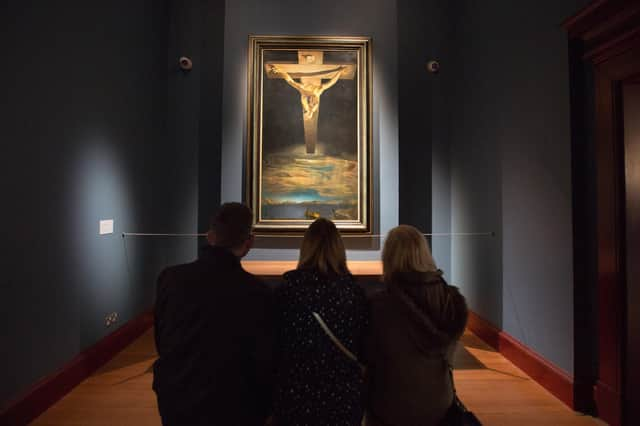Dani Garavelli: The cost of living crisis is closing in on our cultural institutions and we should be worried


Those excursions were good for us both. Alcoholism is such a reductive disease; the “problem” can become so big it swallows up the person. Looking at art allowed my friend to escape the pitiless grind of attending (or avoiding) GP and benefits appointments, and be who he always was. It allowed me to put all the scrutiny and “to-do” lists on hold, and take pleasure in his company. “I wish you’d stop gate-keeping,” he sometimes said. But not that day.
I have been thinking about our trip a lot. In part, that’s because the first anniversary of his death is fast approaching, and oh, how he would have loved the John Byrne exhibition. But it’s also because the cost of living crisis is putting some of our greatest cultural treasures in jeopardy. Last week’s news that the Edinburgh International Film Festival (EIFF), the Edinburgh Filmhouse and Aberdeen’s Belmont Filmhouse, had stopped trading sent shock waves across the country. Then, the director general of the National Galleries of Scotland, Sir John Leighton, warned some venues faced full or partial closure.
Advertisement
Hide AdAdvertisement
Hide AdMeanwhile, in Glasgow, the Kelvingrove and the Gallery of Modern Art are set to be handed over to one of the city’s arms-length external organisations (ALEOs) in a “sale and leaseback” arrangement, with unanswered questions about the risks.
Having made it through the pandemic, more arts organisations are predicted to fall foul of a “perfect storm” of falling footfall and soaring energy bills. So far coverage of the cost of living crisis has, understandably, focused on putting food on the table and money in the electricity meter. But I worry we’ll forget that, for life to be fulfilling, we need to do more than just survive. And that culture lies at the core of what it means to be human.
Once upon a time, this was uncontroversial. Edinburgh’s festivals grew out of a post-war internationalism and a belief in the redemptive, unifying power of the arts. Some may argue those festivals were elitist. But the expansion of public libraries, the establishment of the Open University and public sculpture in Scotland’s new towns shows culture was not perceived as the sole preserve of the middle classes.
From then until the late 70s, the emphasis was on improving people’s lives, not only economically, in terms of jobs, or materially, in terms of housing conditions, but intellectually, in terms of access to books, theatres and galleries.
That post-war consensus ended with Margaret Thatcher. Under recent Tory governments a more savage devaluing of the arts has been taking place, the party’s scorn summed up by its ad encouraging ballet dancers to retrain in cyber-security, and Gavin Williamson’s decision to cut funding for university arts courses by 50 per cent.
“The current system would rather our young people got degrees in Harry Potter than apprenticeships in construction,” Skills Minister Andrea Jenkyns told the Tory party conference.
And there you have it. The Conservatives are snide about culture and believe people of a certain background should concentrate on manual labour. It’s an attitude which has bled out beyond the political sphere, as Booker Prize foundation director Gaby Wood demonstrated when she mocked a Scunthorpe book club for counting a steel worker and dinner lady among its members.
Nor is such ignorance confined to the right, or London. In February, the general secretary of the GMB, Gary Smith, called on Glasgow City Council to sell the Dali to settle its equal pay debt. How bizarre to hear a trade unionist pitting unjustly treated working class women against an artwork bought for the benefit of every citizen, rich and poor. There were those who criticised the purchase back in 1952. But every year, hundreds of thousands of people stand where we stood, gazing up at it in wonder. How do you put a price on that?
Advertisement
Hide AdAdvertisement
Hide AdThere are no easy answers. The circumstances that drove the Centre for the Moving Image - the charity behind the EIFF and the two cinemas - into administration remain unclear; saving them may require more than just another injection of public funds. The Glasgow equal pay debt is a conundrum caused by a righteous commitment to address a historic injustice at a time of economic precarity. More generally, I accept it’s a struggle to strike a balance between competing financial demands at a time when need is escalating and the UK government is ideologically opposed to redistribution.
Still, deaths caused by drugs and alcohol are rising in Scotland. The roots of despair are complex: trauma, poverty, low self-esteem, isolation. What my friend needed most were services that weren’t broken. Fixing them must be the Scottish government’s priority. But human beings crave spiritual as well as physical nourishment. They hunger for beauty and meaning. That’s what the arts, at their best, provide. As the cost of living crisis closes in on our cultural institutions, politicians ignore this at their peril.
Comments
Want to join the conversation? Please or to comment on this article.